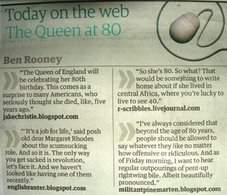
The Militant Pine Marten's sources report that Segolene Royal's campaign team appear to be testing a new way of connecting with voters in a way that is truly relevant to them. It's certainly more appealing than Sarkozy's tubthumping.
Hubristically assuming that the Militant Pine Marten has any regular readers, they presumably know that it dislikes Nicolas Sarkozy because of his authoritarianism and disdain for civil liberties, his predilection for repressive means to tackle any problems that come under his remit as France's Interior Minister, his general outspoken Blunkettness. However in a spirit of open-mindedness, and indeed curiosity, the Pine Marten decided yesterday to attend Sarkozy's public meeting held at Old Billingsgate Market in the City, to hear from the man himself what he had to say, and also to obtain some sort of idea on the sort of man that he is from such ethereal sources as his tone of voice, body language, and any ad-lib statements. I intend to simply give an account of Sarkozy's performance and its' content, keeping it as objective and dispassionate as possible. This is a significant departure from the Pine Marten's usual opinionated approach, so please bear with me, I'm making an effort here. I’d be delighted to engage in discussion subsequently, in the unlikely event that anyone takes me up on the offer. At half-past six yesterday evening, the queue in front of Old Billingsgate Market opposite the Monument stretched all the way from the doors to Customs House about 200-300 metres down Lower Thames Street. The first noticeable thing was that people in the queue were overwhelmingly young people, from 17 or 18 year olds about to vote in their first presidential election to those aged about thirty, who have moved to London for work purposes, via students studying in London. Chatter in the queue indicated that although many were fervent Sarkozy supporters, which is hardly surprising at a campaign meeting, many were also there simply to hear what he had to say, being still unsure who to give their vote to. Clearly for all main candidates, everything is still to play for because a lot of people are undecided, and although the "tribal" centre-right and Socialist electorates still exist, they're seriously shaken. Everyone is listening very carefully to what Sarkozy has to say, but they will be doing the same for Ségolène Royal.
At half-past six yesterday evening, the queue in front of Old Billingsgate Market opposite the Monument stretched all the way from the doors to Customs House about 200-300 metres down Lower Thames Street. The first noticeable thing was that people in the queue were overwhelmingly young people, from 17 or 18 year olds about to vote in their first presidential election to those aged about thirty, who have moved to London for work purposes, via students studying in London. Chatter in the queue indicated that although many were fervent Sarkozy supporters, which is hardly surprising at a campaign meeting, many were also there simply to hear what he had to say, being still unsure who to give their vote to. Clearly for all main candidates, everything is still to play for because a lot of people are undecided, and although the "tribal" centre-right and Socialist electorates still exist, they're seriously shaken. Everyone is listening very carefully to what Sarkozy has to say, but they will be doing the same for Ségolène Royal. Inside the building, giant screens, boards bearing Sarkozy's slogan "Ensemble tout est possible" (reminiscent of the SNCF's '90s "SNCF: tout est possible") and drawing of open fields with a seagull flying over them, lighting, cameras, and all the paraphernalia of the modern, media-savvy political campaign organisation. UMP and other dignitaries in the front rows, press and TV on the sides of the stage, and a few dozen 16-19 year olds in white "Nicolas, on y croit!" tee-shirts sitting behind a cordon on the right-hand side of the stage, some carrying French flags.
Inside the building, giant screens, boards bearing Sarkozy's slogan "Ensemble tout est possible" (reminiscent of the SNCF's '90s "SNCF: tout est possible") and drawing of open fields with a seagull flying over them, lighting, cameras, and all the paraphernalia of the modern, media-savvy political campaign organisation. UMP and other dignitaries in the front rows, press and TV on the sides of the stage, and a few dozen 16-19 year olds in white "Nicolas, on y croit!" tee-shirts sitting behind a cordon on the right-hand side of the stage, some carrying French flags.
At about half-past seven, to raucous applause, Nicolas Sarkozy walks onto the stage, the crowd having been warmed up by a frankly hilariously sycophantic welcome speech by the London Delegate of the UMP. He began with praise for the host city, "the seventh French city" (a reference to the estimated 200,000 French nationals living in London), which had welcomed many French greats in the course of its history. First to be mentioned was Napoleon, who applied for asylum in England at one point. He was followed by General de Gaulle and the Free French, and Sarkozy thanked London for this, and for enabling the Resistance in WW2. This was met by a approving roar from outside the building where about a thousand people who hadn't been able to enter the hall ("As we know, the British don't mess with safety regulations" said the UMP delegate) were following the event on big screens. This prompted Nicolas to announce with a big grin that he "hopes to always have this problem". Carrying on with the customary homage to de Gaulle, he had incorporated some of the general's famous quotes into the speech, notably that he has "a certain idea of France", and he praised "France, the France of always", as de Gaulle did after the Liberation of Paris in 1944. He then moved on to a section especially targeted at French expats, pointing out that viewed from abroad, France's shortcomings are more clearly apparent, that having left France, contrary to what many of those who have remained claim, didn't mean that expats were less French, or had forsaken France. And that indeed, because absence makes the heart grow fonder, they were even more dismayed, and didn't see why France would do less well than other countries, when it has everything it needs to succeed. He added that from the outside, people saw only results, not obstacles and problems as some within the country may primarily see. Sarkozy finally added that by being outside France, expats "serve France in her universal and international dimension".
He then moved on to a section especially targeted at French expats, pointing out that viewed from abroad, France's shortcomings are more clearly apparent, that having left France, contrary to what many of those who have remained claim, didn't mean that expats were less French, or had forsaken France. And that indeed, because absence makes the heart grow fonder, they were even more dismayed, and didn't see why France would do less well than other countries, when it has everything it needs to succeed. He added that from the outside, people saw only results, not obstacles and problems as some within the country may primarily see. Sarkozy finally added that by being outside France, expats "serve France in her universal and international dimension".
At this stage, he began to talk about his bid for the presidency, with a rhythmic succession of seven or eight sentences following the following format: "I want to be the president of a France that isn't timorous, that isn't scared of others of the future!" (This is proper tugging at the red, white and blue heartstrings stuff by the way). He then gave the reasons for which people left France such as the fact that work wasn't paid sufficiently, that risk-taking was frowned upon, backed up by examples of illustrious Frenchmen who had left to continue their work elsewhere such as the chap who discovered AIDS, who couldn't continue his research in France as he had reached the mandatory retirement age so left for the USA. Groups singled out as being particularly likely to leave were scientific researchers, entrepreneurs, those without degrees that no-one will give a chance to in France. He ended this section by saying that "there was no doom to decline" and that "decline and fatalism were not part of [his] vocabulary."
Beginning his home run, Sarkozy launched a full-scale attack on the Left, the ideals of May 1968 and the presumed negative attitude to work as a virtue. This last section is probably best transcribed as a series of sound-bites, as this essentially what it was:
He mentioned some actual specific policies:
Finally, a few choice words on egalitarianism and state assistance:
 The event ended with a stage invasion by the Jeunesses Sarkozistes, a rousing chorus of the Marseillaise with waving flags on the stage that everyone joined in, because it is after all a bloody good song, then the Sarko Youth sang Happy Birthday to the UMP delegate, and Sarko went for a crowd bath.
The event ended with a stage invasion by the Jeunesses Sarkozistes, a rousing chorus of the Marseillaise with waving flags on the stage that everyone joined in, because it is after all a bloody good song, then the Sarko Youth sang Happy Birthday to the UMP delegate, and Sarko went for a crowd bath.
As attendees waited for twenty minutes at the doors as the Fuzz refused to let us out for some reason, opinion seemed to be mixed. Certainly there didn't seem to be any of the Sarkozy fervour that the Pine Marten eavesdropped on earlier. People weren't impressed by the anaemic rip-off of the theme from The Big Country that would seem to be Sarkozy's campaign anthem. To be fair, it's quite aggravating, and rather alien to a French election campaign. I suspect that his attack on what he called "Youthism" may have dampened the ardour of the predominantly youthful crowd. As a courtesy, I'll let Sarkozy have the last word: "One is never disappointed when one strives to make of one's life something greater than it is". He said that in the context of asking people to work for his campaign, but feel free to take it out of context and make of it what you will.

